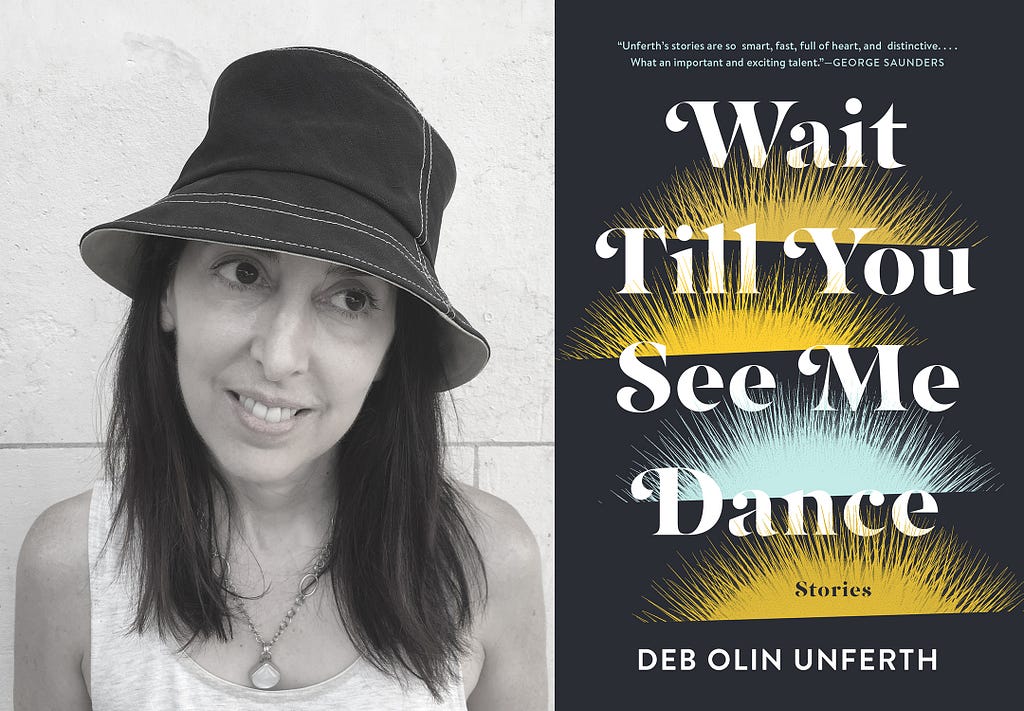interviews
Taking a Story Somewhere Dangerous
Deb Olin Unferth talks about building a story out of a message board and reliving the worst moments of her life

In her collection Wait Till You See Me Dance, Deb Olin Unferth deals in turns of phrase and turns of luck. There are dips into wells and lifts over dunes, and the step-ball-change of shifting intentions. A shooter describes a family on a beach dodging bullets as “Keatonesque.” In the story, “Draft,” a description of the scraps of an incomplete story quickly sprints from “shifting dots of sunshine on the floor” to “botched, bloody murder.” It is a limber collection with the dexterity and precision to launch in most any direction. If Unferth’s book is a dance floor, it is a dance floor unmoored, the dancers in constant and immediate danger.
Perhaps the greatest peril here is that of love, both in its presence and absence, the way it can appear and disappear, conjured and then obliterated. “Who can explain the recession of love?” asks one of Unferth’s narrators. “Love’s sneaky decline?” In her story “The Magicians,” Unferth writes about Houdini’s “elephant room”: a room too small to fit an elephant, and yet, of course, it populates itself with an imagined elephant the minute the listener hears the story. She writes, “by calling it the elephant room he had made me imagine the elephant in that room…It became the elephant room by magic.” Unferth’s stories engage in this sort of sorcery, populating rooms with love even if love is crushing, is absurd, is too large to fit through the door.

Hilary Leichter: The story “Your Character” is such an amazing meditation on the randomness and brutality of creation, the way a character’s fate can spring from a simple turn of phrase. And maybe the way a real, human life can also spring from an arbitrary series of sentences smushed together. Why did you choose to put the story in the second person? I wondered at who might be speaking, and whom they might be addressing.
Deb Olin Unferth: I’ll tell you how that story came about. I was working on a novel, and getting insanely frustrated, so I typed into a google search “how to write a novel,” which seemed the best way to go about it in the moment. I read around on a bunch of different websites, mostly about how to write horror and fantasy, and then I stumbled on a novel-writing forum, which seemed to have thousands of people contributing (is this inspiring? I’m not sure). One thread, under the “plot” category went something like, “What to do with your character if you’re stuck.” And there were hundreds of responses, pages and pages of them, a string of sentences, each beginning with “Your character,” such as “Your character is hanging by a piece of yarn over a fire.” Very similar to the ones in the story. I loved it and began hearing the story in my head before I’d even left the thread. I wrote it all out very fast, modeling mine after the ones in the thread and even just taking some more or less word for word, and then I spent a long time arranging them so that I felt the story had its own little arc — such as you come upon a series of sentences about water, or a series about sleeping, or a series about the love interest, and so on.
A Story of a Murderous Adjunct by Deb Olin Unferth
HL: The stories in your collection range from a paragraph to many pages long, and yet even the tiniest of the bunch feels complete, a perfect morsel. How do you know when a story is done?
DOU: Yes, the shorts — like “Your Character” — I tend to see whole before my eyes before I write them, or as I’m drafting them. Many in the collection are like that: me hearing something in my mind and getting it down. The longer pieces are different and take immense plotting and developing. I often think a story is done long before it is, or a story is done and yet it sits in a corner for years, mostly forgotten. I don’t have a good system.
HL: When you set out to writing, do you have a sense whether a story is destined to be closer to flash fiction, or something longer?
DOU: Yes, I usually know. Sometimes I try to squeeze one into another — grow out a short piece or squash a long piece and it rarely works.
HL: In “Granted,” we see two historians struggling to spend the grant they received to travel to an unnamed country. They must spend it all, and can’t seem to spend enough on anything. I love the way this piece unravels around the title and the premise, until it ends up somewhere extreme and surreal. A similar thing happens with the story “Likable,” in which variations on the word in the title are almost weaponized so that we might end up at the final sentence, a gasp-worthy moment. What is the seed for these kinds of stories? Do they start with the title, with their exuberant conclusions, or somewhere else completely?
DOU: “Weaponized,” I like that. The repetition I like the most in prose is perhaps Steinian, or maybe that’s just how I think about it. My thinking is: each time I come upon a repetition of a word or a phrase my experience of it should be different. The meaning of it should shift so that each time I see it, the word surprises me with its newness. By the time I reach the end, I want the word to have come to have many meanings, many connotations, and to produce many emotions.
“Each time I come upon a repetition of a word or a phrase my experience of it should be different.”
I studied philosophy as an undergraduate and now I live with a philosopher. Definitions are the lifeblood of philosophy. What would philosophers do if they didn’t have anything to define or if they weren’t considering different shades of meaning? They’d have to take down their shingle.
HL: I first encountered your prose while working on NOON with Diane Williams. Can you talk a little bit about how NOON has influenced your writing?
DOU: I talked at length about how I met Diane Williams and how essential she was to my becoming a writer here, and every word of it is still true. I would add to it that I have watched her discover a new generation of writers in recent years. Her touch is perfect. No one knows the sentence better than she, no one can track sound across a page or hear the off-note in a line like she can. I simply and baldly love her without reservation.
HL: Many of your stories here feature teachers and students, and the complicated ways those relationships can unfold. There’s this great line in the title story of the collection: “I was what is called an adjunct: a thing attached to another thing in a dependent or subordinate position.” Can you speak a little bit about how your own experiences as a teacher have influenced your writing?
DOU: I once had a book called What Color Is Your Parachute that is supposed to help you figure out what you should do to support yourself without wanting to kill yourself. They help you determine your best money-making match by having you do a series of convoluted exercises and filling out huge numbers of charts and making bigger and bigger charts. So I did it all, I had charts taped together all over my floor (yes, on paper), and at the end of all of it — and it took weeks — the book declared very simply that I should be a teacher. And that was exactly right. I love being a teacher! In fact summer gets to be a little hard on me psychologically with no teaching.
But some of the worst days of my life have been spent teaching. By that I mean, the most depressing periods in my life, I was usually in the middle of a semester and had to turn up and turn it on and bring it on with a smile. I remember crying in the bathroom many times when I was an adjunct. I remember students coming in and seeing me blowing my nose and wiping my tears. Being an adjunct is the worst. I channel some of that into my stories.
HL: In your story ‘Voltaire Night,” the teacher and students in a writing class take one night of the semester to share the worst thing that has happened to them: in the past week, month, in their entire lives. I want to do reverse Voltaire Night with you. What’s the best thing that happened to you this week?
DOU: That’s easy. In addition to being a professor at the University of Texas at Austin, I run a prison creative writing certificate program at a prison in southern Texas. One of my students made my husband and me wooden boxes — a jewelry box for me and a “manbox” for him, where he can toss his keys and change when he comes in the door. I have never been more touched by a gift.
Yeah, you can’t get away with Voltaire Night anymore. No one wants to talk about the bad things that happened. I’ve noticed this. It’s always “most embarrassing moment” or “most looking forward to,” etc. I tried last semester to get my students to tell stories about the worst thing that had happened to them and they looked at me like I was deranged.









